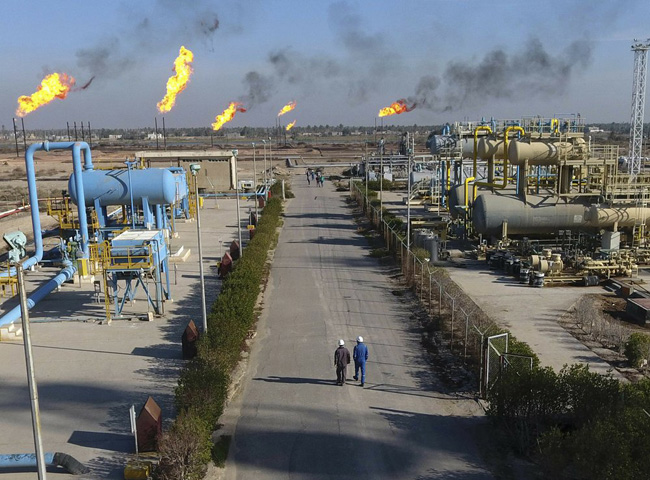
According to the International Monetary Fund, the economies of all Gulf Arab oil-exporting countries will shrink this year.
Baghdad … News Time
Iraq plans to reduce social benefits for millions of government employees, while major projects in Saudi Arabia are likely to be delayed Egypt and Lebanon are facing huge economic losses due to low remittances from workers in the Gulf. The Associated Press (AP) reports that a drop in oil prices due to the coronavirus epidemic has led to an economic crisis in oil-dependent Middle Eastern countries.
According to the International Monetary Fund, the economies of all Gulf Arab oil-exporting countries will shrink this year, compared to an estimated 5% in Iraq. While a few Gulf countries are able to rely on foreign exchange reserves, the situation is unparalleled in Iraq, where oil sales alone fund 90 percent of the state’s budget. Iraq has seen mass protests in recent months due to a weak economy and corruption, and the situation could re-emerge. The reduction in spending has already added to the woes of the people who are struggling with sanctions imposed by the coronavirus. There are still protesters in Tahrir Square in the Iraqi capital, determined to keep their movement alive. Iraqi analyst Sajad Jiyad said a major storm was brewing for the government as winter approached.
The price of oil in the world market is currently 20 20 per barrel, which is sometimes even lower. The market could face further difficulties until an agreement is reached to reduce production by 23% to stabilize OPEC’s oil market. May and June will be the most difficult months when oil storage facilities will not be available and countries will have difficulty in getting oil to the market. Robin Mills, CEO of Qamar Energy in Dubai, said it would be premature to say at this time because no one is facing a situation where their budget has run out. But while that may not be the case, Iraq is likely to be the first victim.
Iraq’s 2020 budget draft relied on oil revenues at 56 56 a barrel to fund much-needed development projects. Iraqi Oil Minister Thamir Ghadhban said revenue from crude oil exports had fallen by 50 percent. Authorities are now discussing pay cuts. According to three Iraqi officials, there is also an offer to withhold payments to public sector workers for these social benefits until their financial situation improves. Officials said on condition of anonymity that the question is how much to reduce and from whom, one suggestion is to deduct 50% of the salaries of those who earn more. It will save Iraq millions of dollars, but it will also raise tensions. Despite this, experts say that if the price of oil stays at 20 20 to 30 30 per barrel, it will not be enough.
Saudi Arabia, the region’s largest oil producer, also plans to cut spending by 5% or 13.3 billion. Further reductions or measures can be expected from Saudi Arabia’s 500 500 billion foreign reserves. The decline in foreign investment and business losses due to the epidemic could potentially delay the construction of new cities and mega projects by Saudi Crown Prince Mohammed bin Salman. Kuwait also has huge reserves, but Bahrain owes more than 105% of its GDP. He has also received a 10 billion bailout package from his neighbors to avoid default in 2018. Other major oil-producing countries will face job losses and economic shocks.
The American Oil Production and Services Company lay off thousands of employees, and if the epidemic continues, there will be more massive layoffs. The epidemic and another drop in oil prices will hit Egypt, Jordan and Lebanon, which rely on workers sending foreign currency home to oil-rich Arab Gulf countries. Remittances to Lebanon accounted for 12.5 percent of GDP, compared to 10 percent in Egypt. “How are we going to live now? Hunger has come to our door,” a Lebanese resident told reporters.



